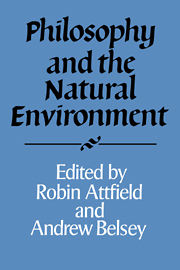Book contents
- Frontmatter
- Contents
- Preface
- Notes on Contributors
- Introduction
- Value in Nature and the Nature of Value
- Ecology and the Ethics of Environmental Restoration
- Rehabilitating Nature and Making Nature Habitable
- Personalistic Organicism: Paradox or Paradigm?
- Values, Reasons and the Environment
- Awe and Humility: Intrinsic Value in Nature. Beyond an Earthbound Environmental Ethics
- The End of Anthropocentrism?
- Global Religion
- Kant and the Moral Considerability of Non-Rational Beings
- The Idea of the Environment
- Chaos and Order, Environment and Anarchy
- Natural Capital
- Some Philosophical Assessments of Environmental Disobedience
- Global Environmental Justice
- Environmental and Medical Bioethics in Late Modernity: Anthony Giddens, Genetic Engineering and the Post-Modern State
- Highlights and Connections
- Bibliography
- Index
Some Philosophical Assessments of Environmental Disobedience
Published online by Cambridge University Press: 19 October 2009
- Frontmatter
- Contents
- Preface
- Notes on Contributors
- Introduction
- Value in Nature and the Nature of Value
- Ecology and the Ethics of Environmental Restoration
- Rehabilitating Nature and Making Nature Habitable
- Personalistic Organicism: Paradox or Paradigm?
- Values, Reasons and the Environment
- Awe and Humility: Intrinsic Value in Nature. Beyond an Earthbound Environmental Ethics
- The End of Anthropocentrism?
- Global Religion
- Kant and the Moral Considerability of Non-Rational Beings
- The Idea of the Environment
- Chaos and Order, Environment and Anarchy
- Natural Capital
- Some Philosophical Assessments of Environmental Disobedience
- Global Environmental Justice
- Environmental and Medical Bioethics in Late Modernity: Anthony Giddens, Genetic Engineering and the Post-Modern State
- Highlights and Connections
- Bibliography
- Index
Summary
Since the late 1970s there has been within the world-wide environmental movement increasing dissatisfaction with moderate or reform environmentalism, and more radical tactics have been advocated and used to respond to the human destruction of nature. These range from typical kinds of political protest, such as rallies and marches, to environmental civil disobedience and the more militant environmental actions known as ‘monkey-wrenching’, ‘ecotage’, or ‘ecosabotage’. The use of these ‘ecotactics’ has led inevitably to controversy in the environmental movement itself and in public discussions of environmentalism in North America and elsewhere. The same cannot be said, however, about academic philosophy, where it is rare to find assessments of these actions or of their connections to the wealth of philosophical ideas in environmental ethics and ecophilosophy. At the same time there are many traditional philosophical theories that have implications for these kinds of behaviour even though the theories were constructed originally without examples of ecotactics in mind. In particular, theories about the nature and justifications of civil disobedience provide yardsticks by which some forms of environmental disobedience can be assessed, and I will turn to two widely known philosophical accounts, those of John Rawls and Carl Cohen, to consider how well they accomplish this task.
- Type
- Chapter
- Information
- Philosophy and the Natural Environment , pp. 183 - 198Publisher: Cambridge University PressPrint publication year: 1994
- 2
- Cited by



